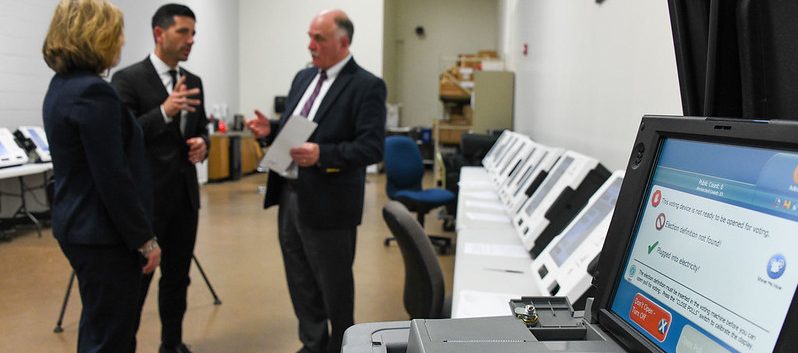The date is Wednesday, Nov. 4, 2020, and just hours separate U.S. residents from the most embittered election in recent history. Poll workers and election officials were not the only ones responsible for carrying out the election, but thousands of IT staffers around the country defended against cyberattacks and made sure systems were up and running.
In North Carolina, the “IT Strike Team” carried out these duties, even as votes are still being counted.
“Ultimately, it serves the citizens of North Carolina with the protection of their data [and] their elections,” said Rob Main, Deputy State Chief Risk Officer for the North Carolina Information Technology Department.
The IT Strike Team is a subset of volunteers from the North Carolina Local Government Information Systems Association (NCLGISA), a group that provides IT training, assistance and collaboration to local governments, K-12 schools and other public cybersecurity professionals.
The team doesn’t work just on Election Day, either, but aids counties and municipalities in emergency incidents yearround. It’s the long-term product of a partnership between NCLGISA and the state IT department. The state has the coffers and technical resources to bolster systems that many local governments do not.
The reason North Carolina chooses to pitch in is a “whole of state” approach to cybersecurity. Through this approach, everything within North Carolina’s borders, and under the public sector purview, is the state’s responsibility. And in this philosophy, a threat to local government is a threat to state government, and a healthier local cybersecurity environment makes the state more secure too.
“Data doesn’t sit just at the state level. It sits everywhere, including at the county level,” said Pearl Kim, a GovLoop Staff Writer who has covered the topic extensively.
Kim and Main were two panelists on GovLoop’s Wednesday webinar about cybersecurity in state and local governments. They were joined by Michael Geraghty, Chief Information Security Officer (CISO) for New Jersey, and Dan Domkowski, Artificial Intelligence (AI) and Machine Learning Delivery Specialist at Red Hat.
AI has fit in nicely as a cybersecurity Swiss Army knife for both North Carolina and New Jersey. When volunteers and staff aren’t available to vigilantly monitor systems, AI can spot intrusions and stomp out attacks. Some features even notice when certain users behave irregularly or when traffic spikes.
“AI is about asking questions that we not only don’t know the answer to, but also sometimes the question as well,” Domkowski said.
Especially as local agencies and schools endure increased attention from attackers during the pandemic, AI’s ability to pitch in has been vital. Automating formerly manual tasks can help agencies handle heightened workloads.
For governments that are short on funding, AI can also be a plus. Geraghty, the New Jersey CISO, encouraged government cybersecurity colleagues to take risks and think unconventionally. Not every solution has to be flashy, he said, and community-sourced tools can take some of the financial burden off agencies, while still layering on a new coat of security.
“You don’t always have to buy the most expensive product,” he said.
This online training was brought to you by:
